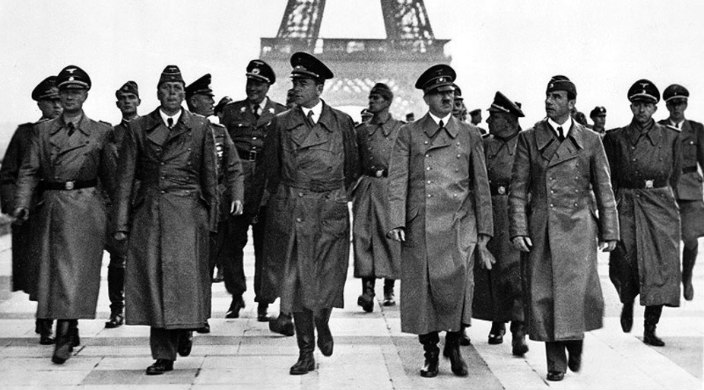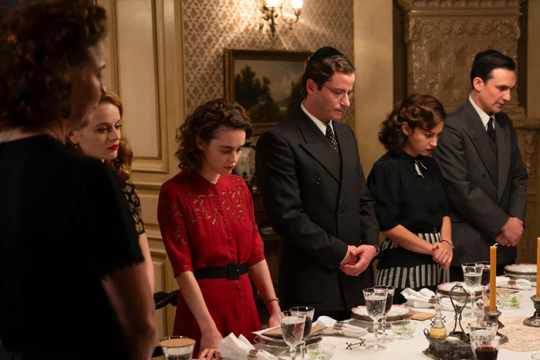
As the son of Jewish Holocaust survivors, I remember, as a child, wanting to kill the monster (who in the 1950s was rumored to be in hiding) responsible for murdering my extended family back in Poland. If he were human, I thought, he could not have unleashed such horrors.
A compelling new biography, Hitler: Ascent 1889-1939 (Knopf), by German historian and journalist Volker Ullrich, aims at “deconstructing the myth of Hitler, the ‘fascination with monstrosity’ that so greatly influenced historical literature and public discussion of the Fuhrer after 1945.” In doing so, he dispels rumors and debunks myths about the roots of Hitler’s anti-Semitism.
Myth #1: Hitler wanted to conceal his Jewish roots.
The rumor that Hitler’s paternal grandfather was a Jewish merchant named Frankenberger and living in Graz can be traced to the memoirs of Hans Frank, the general governor of Nazi-occupied Poland who was hanged in Nuremberg in 1946. In fact, no Jewish family by that name lived in or around Graz. “There is no evidence that Hitler ever took speculations about his supposed Jewish grandfather seriously,” writes Ullrich, “to say nothing of feeling threatened by them.”
Myth #2: The root of Hitler’s pathological hatred of Jews was in reaction to the death from breast cancer of his beloved mother, Klara, who was under the care of a Jewish physician, Dr. Eduard Bloch.
“There is no evidence for this assertion,” writes Ullrich. In fact, “the day after Klara Hitler’s funeral, the 18-year-old Hitler appeared in Bloch’s office and declared, ‘I will forever be grateful to you, Doctor.’ And he did not forget his gratitude in his later years. In 1938, when he celebrated Austria’s incorporation in to the German Reich with a triumphant march into his ‘home city’ of Linz, he is said to have asked, ‘Tell me, is good old Dr. Bloch still alive?’ Alone among Linz’s Jews, Bloch was put under the special protection of the Gestapo. In late 1940, he and his wife were able to flee to the United States via Portugal.”
Myth #3: Hitler was already an anti-Semite when he moved from Linz to Vienna at the age of 20.
In his 1925 autobiography, Mein Kampf, Hitler wrote that in Vienna, “I went from cosmopolitan weakling to fanatic anti-Semite.” Ullrich differs from most of Hitler’s biographers, who he says “have taken this statement at face value, for it seems plausible that Hitler’s obsession with Jews was a compensatory mechanism for his failure as an artist…. He agrees with historian Brigitte Hamann that “Hitler’s account was just one of the many legends with which the demagogue… tried to suggest that his world view had developed in a straight line.”
In fact, as Ullrich points out, during the three years the impoverished young Hitler lived in a men’s home in Vienna, he “had no problems in his day-to-day interactions with the Jewish residents… and he even maintained something approaching a friendship with [Josef] Neumann,” a Jew who peddled Hitler’s hand-painted postcards featuring famous Vienna landmarks. Another Jewish resident, Simon Robinson, occasionally provided Hitler with small sums of money. Hitler was “finally was able to stand on his own two feet” after two Jews, Jakob Altenberg and Samuel Morgenstern, merchandized Hitler’s postcards in their picture framing and art shops.
During this period, writes Ullrich, Hitler “praised charitable Jewish organizations in Vienna from which he as a pauper had personally benefited, dismissed anti-Semitic claims that Jews carried out ritual murder, and defended the cultural achievements of Jews like poet Heinrich Heine and the composer Gustav Mahler.”
Hitler did not experience an anti-Semitic epiphany in Vienna, as he would later claim. “He did seem to have shared some of the anti-Semitic prejudices and clichés that abounded in German nationalist circles,” notes Ullrich, “but he was a long way away from the paranoid Jew-hatred that would become the centerpiece of his political activity.”
Myth #4: Hitler moderated his anti-Semitism at the beginning of his political career in the aftermath of WWI.
According to Ullrich, “He made no bones about who he considered responsible for military defeat and revolution: ‘the Jews, who alone are profiting from it and don’t shy away from inciting civil war with their rabble-rousing and base agitations.’ Hitler proclaimed “Germany for Germans” and demanded a stop to Jewish immigration, arguing, “We refuse to tolerate our destiny being ruled by a foreign race.”
The rest, as they say, is history.
Related Posts

“We Were the Lucky Ones:” Bringing The Holocaust Out of History Books and Into Our Homes

Harnessing the Power of our Mothers Around the Seder Table


